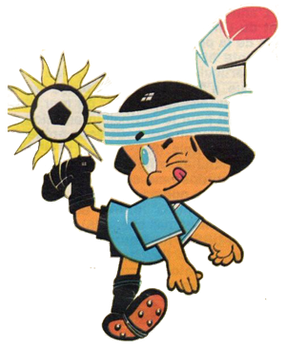1980 World Champions' Gold Cup
International football competition From Wikipedia, the free encyclopedia
The 1980–81 FIFA World Champions' Gold Cup (Spanish for "Copa de Oro de Campeones Mundiales"), also known as Mundialito ("Little World Cup"), was an international football tournament organized by the Uruguayan Football Association and supported by FIFA[1][2] and recognized before its inception by then FIFA President João Havelange.[3] At the July 4, 1980 FIFA congress, the president publicly stated: "At FIFA we have welcomed the initiative of the Uruguayan Football Association, granting official status to the Gold Cup. FIFA actively participates in the organization and offers its experience."[3] The tournament commemoration of the 50th anniversary of the first FIFA World Cup, which had been celebrated in 1930 at the same venue. It was held at the Centenario Stadium in Montevideo, Uruguay, from 30 December 1980 to 10 January 1981.
| Copa de Oro de Campeones Mundiales Uruguay 1980–81 | |
|---|---|
| Tournament details | |
| Host country | Uruguay |
| Dates | 30 December 1980 – 10 January 1981 |
| Teams | 6 (from 2 confederations) |
| Venue(s) | 1 (in 1 host city) |
| Final positions | |
| Champions | Uruguay |
| Runners-up | Brazil |
| Tournament statistics | |
| Matches played | 7 |
| Goals scored | 19 (2.71 per match) |
| Attendance | 255,000 (36,429 per match) |
| Top scorer(s) | Waldemar Victorino (3 goals) |
| Best player(s) | Ruben Paz |

The tournament gathered the national teams of Uruguay, Italy, West Germany, Brazil, and Argentina,[4] five of the six World Cup-winning nations at the time, with the addition of the Netherlands –1974 and 1978 World Cup runners-up– who had been invited to replace England, who declined the invitation. After the final, FIFA celebrated the success of the tournament via their official newsletter, declaring Uruguay as "champions of all world champions."[5]
Participating teams
| Team | Notes |
|---|---|
| 1924 and 1928 Olympic champions; Hosts, 1930 and 1950 FIFA World Cup champions | |
| 1934 and 1938 FIFA World Cup champions | |
| 1954 and 1974 FIFA World Cup champions | |
| 1958, 1962, and 1970 FIFA World Cup champions | |
| 1978 and reigning FIFA World Cup champions | |
| 1974 and 1978 FIFA World Cup runners-up, replacing |
Format

The six teams were distributed in two groups of three: Group A was composed of the Netherlands, Italy, and Uruguay; Group B consisted of Argentina, Brazil, and West Germany. The winners of each group faced each other to decide the tournament winner.
Squads
Each team had a squad of 18 players (two of which had to be goalkeepers).
Outcome
Uruguay and Brazil won their respective groups and played the final, with Uruguay defeating Brazil 2–1 with a late goal, the same result that had occurred 30 years earlier between the two teams in the deciding match of the 1950 World Cup. Uruguay's coach during the Mundialito, Roque Máspoli, had also been Uruguay's goalkeeper in the 1950 match.
Dutch manager Jan Zwartkruis resigned from his position as soon as he returned to the Netherlands,[6] while Leopoldo Luque and Rainer Bonhof never represented their country again.[6]
Group stage
Group A
| Pos | Team | Pld | W | D | L | GF | GA | GD | Pts | Qualification |
|---|---|---|---|---|---|---|---|---|---|---|
| 1 | 2 | 2 | 0 | 0 | 4 | 0 | +4 | 4 | Final | |
| 2 | 2 | 0 | 1 | 1 | 1 | 3 | −2 | 1 | ||
| 3 | 2 | 0 | 1 | 1 | 1 | 3 | −2 | 1 |
| Uruguay | 2–0 | |
|---|---|---|
| Ramos Victorino |
| Italy | 1–1 | |
|---|---|---|
| Ancelotti |
Peters |
Group B
| Pos | Team | Pld | W | D | L | GF | GA | GD | Pts | Qualification |
|---|---|---|---|---|---|---|---|---|---|---|
| 1 | 2 | 1 | 1 | 0 | 5 | 2 | +3 | 3 | Final | |
| 2 | 2 | 1 | 1 | 0 | 3 | 2 | +1 | 3 | ||
| 3 | 2 | 0 | 0 | 2 | 2 | 6 | −4 | 0 |
Final
| Team details | |||||||||||||||||||||||||||||||||||||||||||||||||||||||||||||||||||||||||||||||||||||||||||||||||||||||||||||||||||
|---|---|---|---|---|---|---|---|---|---|---|---|---|---|---|---|---|---|---|---|---|---|---|---|---|---|---|---|---|---|---|---|---|---|---|---|---|---|---|---|---|---|---|---|---|---|---|---|---|---|---|---|---|---|---|---|---|---|---|---|---|---|---|---|---|---|---|---|---|---|---|---|---|---|---|---|---|---|---|---|---|---|---|---|---|---|---|---|---|---|---|---|---|---|---|---|---|---|---|---|---|---|---|---|---|---|---|---|---|---|---|---|---|---|---|---|
| |||||||||||||||||||||||||||||||||||||||||||||||||||||||||||||||||||||||||||||||||||||||||||||||||||||||||||||||||||
Scorers
See also
References
Wikiwand - on
Seamless Wikipedia browsing. On steroids.
